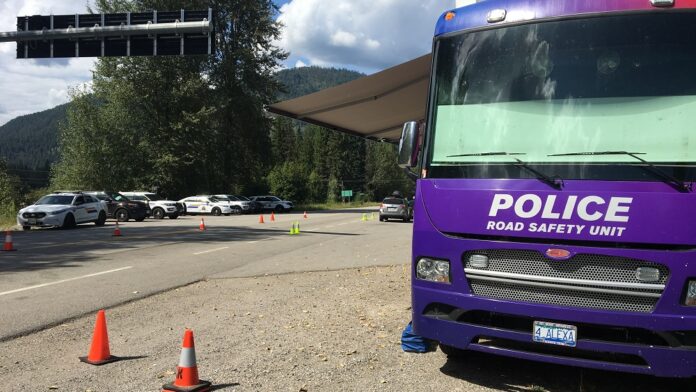The B.C. Highway Patrol has boosted its presence in the region this week for what it calls “influx week,” ahead of the 26th annual Shambhala Music Festival.
The festival, held at Salmo River Ranch southeast of Salmo, draws more than 22,000 people annually for its three‑day run, which this year takes place July 25–28.
During influx week, the B.C. Highway Patrol is running a zero‑tolerance enforcement campaign focused on speeding, distracted and impaired driving.
“The week prior to Shambhala, as everyone’s coming in, is a zero‑tolerance week, meaning anything we find, someone’s going to get a ticket for. It’s a very high‑visibility police enforcement campaign designed to educate people to do the right thing,” said Nelson Highway Patrol officer Vince LeBlanc.
This could mean a violation ticket or a warning, but LeBlanc emphasised officers will show zero mercy in the days leading up to the festival.
“There’s 22,000 people coming to Shambhala. That’s more than the population of many communities in our region. That means a lot of extra cars on the road – plus all the other tourists in the area. We will be doing check‑stops for impaired driving, seat‑belt infractions, cell‑phone use – that sort of thing.”
Aggressive driving
In 2024, influx week led to one impaired driver being removed from the roads and more than 400 tickets issued – 31 of them for excessive speeding and aggressive driving.
LeBlanc said high‑risk driving is a major priority this week, noting that across Canada, the majority of collisions are linked to aggressive driving behaviours.
“The major causes of fatalities across Canada are aggressive driving: speeding, crossing double solids, impaired and distracted driving and we’ll be watching for all of that.”
During influx week, the Highway Patrol typically sees the most aggressive‑driving incidents on major highway routes.
As a result, motorists will notice increased officer presence this week on Highway 3 at the Bombi Pass, Kootenay Pass and Paulson Summit as officers work to keep roadways safe.
“Those are generally where we find our biggest offenders, especially aggressive driving. If you’re driving those routes, be cautious. You never know who’s beside you or what they’re going to do.”
Additional resources are being brought in to assist during influx week and the days after the festival.
In the week leading up to the event, LeBlanc said four motorcycle officers have been deployed from across the province, alongside K‑9 teams.
“This bolsters our presence and increases enforcement – not just looking for speeders, but also for travelling criminals and other threats.”
Post-festival check-stop
During the festival, patrols will remain active near the festival grounds – but enforcement will intensify significantly in the days after, with check‑stops targeting vehicles leaving the grounds.
LeBlanc said the same check-stop van from Vancouver, used in previous years, is set to return once again.
Last year, officers conducted 70 standard field‑sobriety tests and 199 mandatory alcohol screenings during two days of eight-hour check‑stops.
A total of 39 people received 24‑hour driving suspensions due to drugs, 19 of whom were referred for Drug Recognition Expert evaluations and performed poorly – resulting in Criminal Code charges.
Motorists leaving the festival on Monday and Tuesday are warned to expect significant delays.
These check‑stops have historically generated controversy due to the high volume of festival traffic – creating lineups in both directions on Highway 3 as vehicles wait to be screened and proceed.
LeBlanc explained the process can be lengthy and asked motorists to be patient and plan accordingly.
“Try to think of a different route to get where you want to go. It’s going to take a long time to get through that check‑stop, just based on the sheer volume of cars.”
He added that it isn’t the processing time that’s long – it’s the number of vehicles needing processing.
“Every single car takes a minute of an officer’s time. That’s a lot of cars, over 22,000 people, so it takes a long time.”
LeBlanc reiterated his message to non-festivalgoers driving in the area: if you can take an alternate route, do so.
“Go a different route – even if that means heading south into the U.S. and popping over – that’s a better choice. Avoid that stretch of highway; it’s going to be slow. I wish there was a better way, but it’s one‑car, one‑driver at a time, and it’s for everyone’s safety.”
The Highway Patrol has been conducting post‑Shambhala check‑stops since 2014, with LeBlanc noting that ever since, Shambhala‑related highway fatalities have nearly dropped to zero.
“So if you choose to indulge at the festival and consume substances that impair your judgment, wait 24 hours before you drive.”
Want to get your business noticed? Have you considered advertising through your local radio station? Speak to one of our sales agents and find out how radio advertising can boost your business today. Call 250-365-7600 or email Vista Radio.





